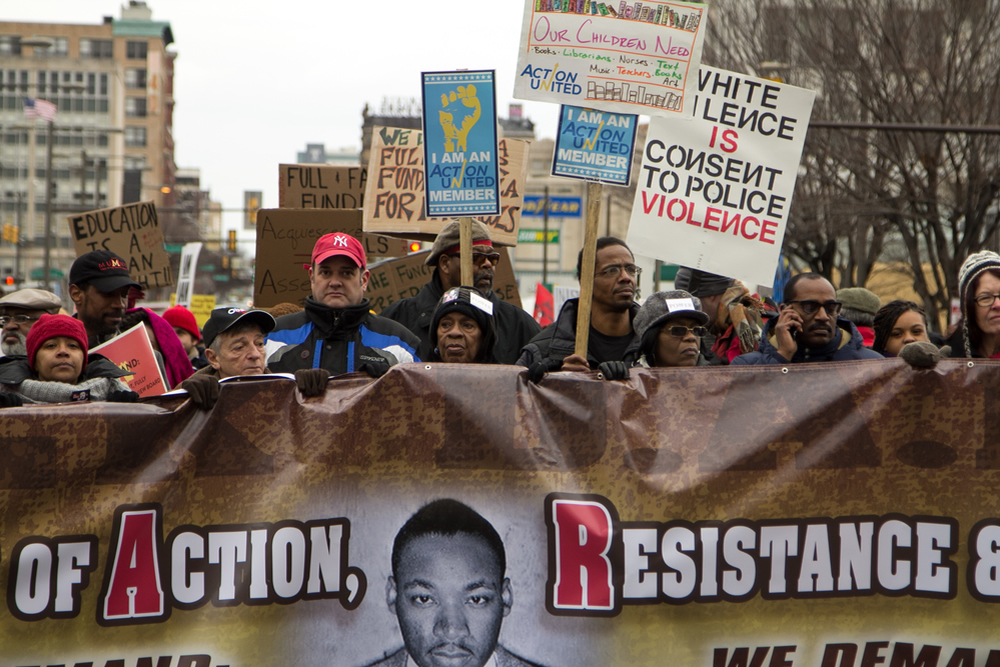Culture, gender, race and other differences can contribute to marginalisation of campaign team staff. This impacts the ability of people to build trust, work together and implement winning strategies. Marginalisation isn’t just bad for people and teams – it’s bad for our work. We wanted to learn more and asked Kaytee Ray-Riek, a campaigner and consultant who has worked with SumOfUs, Ultraviolet and others, to share her insights.
You know that sense you get when you’re in a place you don’t feel welcome? I feel it in my lungs and can’t breathe deeply. I become so aware of not feeling welcome that I don’t speak up–which is pretty remarkable if you know how much I normally talk!
This is the feeling of being marginalised in a group. We’ve no doubt all experienced it at some point. It feels crappy and makes you want to leave the group. Or, if you stay, you might shut down or just not bring your whole self to the people there.
I’ve seen marginalisation at work in campaigns, organisations, trainings, conferences and even in progressive activist networks. Organisers, trainers, managers and facilitators I work with are seeing it in even the most “functional” groups. Marginalisation shows up in these places because we live in a world steeped in sexism, racism, homophobia, transphobia and more. We should expect to see it in activist spaces, too. But I know we can do better.
Tackling this dynamic head-on is crucial to fostering a diverse and equitable group culture. It means more trust and respect and, at the end of the day, it means you’ll have the team you need to win your campaigns.
Our goal as leaders must be to create a culture that empowers everyone to talk about what’s working, what isn’t, and how to do better. This might sound scary. And maybe a little embarrassing at first–like being handed a tube of deodorant and encouraged you to, ahem, kindly use it. But you’ll be glad you knew what was going on. After all, the consequences of building strong, equitable organisations are far greater than being nudged about hygiene.
Want to get started? Here’s what I’ve found works:
[1] Encourage people to speak up when something isn’t working for them. Often, leaders and others in a group’s mainstream get defensive and nervous when hearing that things aren’t working for everyone. I get it. Hearing about mistakes and shortcomings is never easy, especially when it hits at a clueless move on your part that reinforces societal oppression.
Seek out concerns people have, ask for ways they are frustrated, and work really, really hard to not get defensive. After all, it’s your job as a leader to grow, learn, and model that experience for others.
And listen to Jay Smooth. Get comfortable with the fact that you’re not 100% perfect all of the time. Encourage people to share ways you and your group could do more to help them feel welcome.
[2] Open conversations with the whole group about how things aren’t working. People may not be able to explain exactly why they’re feeling marginalised. They just know that something’s not right.
That feeling may cause one to stop showing up to meetings, start searching for a new job, or not volunteer for tasks. Whole-group conversations can help a person identify, name and know how to talk about what concerns them so that everyone can work to fix it.
A note: I highly recommend hiring an external facilitator who can support this conversation, at least initially. That way, everyone can participate fully.
[3] Set goals around equity and talk about the progress, or lack of progress, towards them. Identifying concerns is one thing. Addressing them is quite another.
A lot of things that make it hard for people to participate fully in our work are hard to fix. Maybe you’re a parent who’s also an organiser and the people you’re organising with can only meet at night when you’d rather be home with your kid. Maybe your management team is mostly white and you’re working to train, promote and hire diverse leaders, but right now there aren’t any open management positions.
The best thing you can do is set transparent goals integrated with overall goals, work hard towards them, and report on progress at regular intervals. We can’t undo oppression overnight but we take real steps to fix things by keeping people in the loop and letting them know that we haven’t forgotten about the real concerns they’ve raised.
[4] Notice and challenge oppressive behavior. There’s a lot to say here, but in short: When we ignore oppressive behavior, no matter who it comes from, we are tacitly condoning that oppression. Whether it’s a volunteer sending around a GIF that reinforces a stereotype about a particular race or the executive director making a joke about trans people in a meeting, your job as a leader is to step in and make sure people know that kind of behavior – no matter how subtle – is unwelcome. That can be scary to do, which is why people don’t always step in.
My suggestion: Write down what you want to say, practice it a few times, and then talk to the person about how, even if they didn’t mean anything by it, they still did something hurtful.
[5] Make group culture clear and explicit. Unspoken rules abound in most organisations. And they make it hard for new and marginalised people to navigate culture.
I encourage groups to write down the kind of culture they want to have so no one has to guess. This is particularly important in employment settings, where unspoken rules could mean the difference between getting promoted and getting fired. Once you’ve written down your culture (here’s a slightly out-of-date but great example from SumOfUs), it’s critical that you regularly reflect on how it’s working, where it’s falling short and how you’re living it.
A caution: If concerns about the written culture are being raised that consistently break down along race, class, gender or other lines that mirror societal oppression, it is critical to make changes to the culture based on those concerns (see tips 1 and 2).
[6] Learn your own shortcomings and change your own personal behavior. No one’s perfect. Challenges are going to show up and we’re going to make mistakes as we go. We all must work to unlearn things society has taught us. There are great trainings like Whites Confronting Racism and Beyond Diversity 101 that may help you explore how racism and oppression are interwoven in your mind, how to untangle them, how to change your behavior and learn from your mistakes.
Now for the hard part: You can do all of this and still not create magical utopian groups where everyone always feels 100% welcome. Proactively improving your group culture won’t inoculate you from difficult moments. Sorry about that.
If you’ve practised working the culture change muscle in your group you will be (more) comfortable with making mistakes. You will have a track record of making changes based on those concerns. And you’ll have the strength to weather the storm.
People who are frustrated will know that instead of swallowing concerns and looking for a new job/volunteer opportunity/activist group, it is worth their time to stay and work to make changes.
Ultimately, that means more resilient and more powerful organisations and movements taking on the biggest challenges facing our world.
One note: I don’t talk specifically about what “good culture” looks like. That’s because it depends on who’s a member of the group, who’s not, how people feel welcome and included or feel marginalised, what country you live in, and so much more. Instead of looking for a checklist of things to do, we need to approach this work by asking people in the group what they need to feel welcome and then work on those things.
Proactively building a strong and equitable culture can’t be a side project. It is fundamental to the work we are doing. The challenges we’re facing are enormous and we can’t afford to create activist spaces that alienate the people working with us to build bridges and win campaigns.
Categories:
culture and leadership



